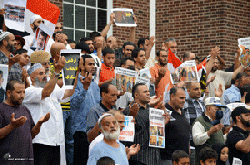DEARBORN — About 350 people gathered in front of Dearborn City Hall on Saturday, July 6, to denounce the Egyptian military “coup” against President Mohamed Morsi and demand reinstating him.
The Egyptian military, headed by Commander Abdul Fattah Al-Sisi, ousted President Morsi on July 3, following mass protests that began on June 30, the first anniversary of Morsi’s inauguration.
Morsi was elected in the country’s first-ever democratic elections, following the overthrow of Hosni Mubarak in the popular January 25 Revolution.
The protesters were mostly Egyptians, but also included other Arab Americans. They displayed English and Arabic signs that read, “I reject the military coup;” “Morsi is my president;” and “Down with SCAF [the Supreme Council of Armed Forces].”
The demonstration was not sponsored, or organized by any particular person, or organization. Ahmed Ghanim, an Egyptian American who lives in Royal Oak, said that people in the community called each other to organize the protest.
The protesters directed most of their chants against Al-Sisi, who commanded the army to oust Morsi.
“The Egyptian Army is ours. Al-Sisi has betrayed us and sold us,” they chanted. “What a shame. What a shame. They bought Al-Sisi and 1,000 morons.”

In a speech at the demonstration, Ghanim drew a contrast between the protesters who were standing in Dearborn, where it was raining, and the protesters who are facing the army in Egypt, where it rains “bullets and blood” instead of water.
“Millions of Egyptian youths stand up to face the military power that turns its bullets on its own people,” he added, referring to the army’s violent crackdown on pro-Morsi protesters. “Whether Morsi gets back to power or not, history will witness that millions of people stood up to tell the tyrants “no” to military rule.”
Egyptian American Protester Mohammad Abu Leila told The Arab American News that the goal of the protest was to support democracy in Egypt.
“We don’t want to go back to military rule and martial laws. We have sacrificed our best youths, so the people could self-govern through the ballot box,” he said.

Abu Leila compared ousting Morsi to the military coup that overthrew King Farouk in 1952, with the difference being that Morsi was democratically elected. He said that an early election would contradict the Constitution, which was ratified by the majority of the Egyptian people last year.
The Constitution, which was suspended by the army after ousting Morsi, sets the presidential term at four years, and limits presidents to two terms in office.
“The situation is hard and tense. I hope that we do not witness violence and blood shed. We don’t want to see thugs from the corrupt police beat the peaceful protesters with cold blood,” added Abu Leila. “We call on the voices of reason from both sides to meet and agree upon a solution that satisfies the democratic ambitions of the Egyptian people.”
Mohammad Attia, an Egyptian American who was at the demonstration, acknowledged that Morsi committed mistakes, including failing to reach out to opponents. But he said that the ousted president should have been able to finish his term and condemned the army’s intervention in politics.
Attia said that he came to the protest to show support for the people in Egypt. He called on President Barack Obama to refer to the recent events as a “coup.”
The Obama Administration has avoided describing the ouster of the Egyptian president by the military as a “coup.” American law bans sending aid to governments that are established after military coups. The U.S. gives $1.6 billion in foreign aid to Egypt every year.
Mahmoud Saadallah was at the demonstration, not to support Morsi, but in search of his pro-Morsi friend. In fact, Saadallah supports the overthrow of the Islamist president.
“It is not a coup after 33 million Egyptians from all over the country protested to overthrow the president. The majority of the people revolted. What more do they want in order to call it a revolution?” he said.
He went on to refute the claim that millions protested for Morsi, explaining that Rabia Al-Adawiyya Square, where pro-Morsi protests are taking place, only accommodates 300,000 people.
Saadallah appeared to favor Mubarak over Morsi.
“You cannot compare somebody who was overthrown by a revolution after 30 years to somebody who was overthrown after one year. Mubarak was a leader, and he fought in the October War,” he said. “Morsi has not contributed anything to the country.”






Leave a Reply